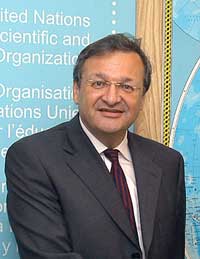Interview with H. E. Mr David Kornbluth, Ambassador Extraordinary and Plenipotentiary, Permanent Delegate of Israel to UNESCO

- © UNESCO/ N. Burke
- David Kornbluth
Interview with H. E. Mr David Kornbluth, Ambassador Extraordinary and Plenipotentiary, Permanent Delegate, Permanent Delegation of Israel to UNESCO, concerning the UNESCO Executive Board's decision on Israeli archeological excavations at the Mughrabi ascent in the Old City of Jerusalem.
What is your reaction to the decision by UNESCO’s Executive Board on archaeological excavations at the Mughrabi ascent in the Old City of Jerusalem?
Obviously it is a compromise. Nobody is happy with a compromise. I am very happy that the consensus mechanism in UNESCO worked, and that we managed to arrive after very long and difficult negotiations at a consensus that was accepted by the Executive Board.
What impact will this decision have on the ground?
I am certain that this will be taken extremely seriously. The government of Israel has to study the decision. We will of course carry it out, and we are working on all aspects of it. There are also things that UNESCO has undertaken to do as well. But all of us here in Israel want to safeguard the cultural heritage of the World Heritage site, which is so important to everybody.
Does this spell the start of a solution to disagreements regarding the preservation of the World Heritage Site of the Old City of Jerusalem?
The subject has now been moved under the aegis of the World Heritage Convention. There is going to be a meeting of the World Heritage Committee very soon in New Zealand. The resolution now makes it clear that the World Heritage Committee has to deal with this issue. I suspect there will be negotiations on it at that meeting.
How would you describe UNESCO's role, or contribution, to improving cooperation between Israelis and Palestinians?
When we started the negotiations, neither side really knew whether we were going to be successful. Clearly, the role of UNESCO has been crucial. We have had an enormous amount of help from a lot of very high-up people in UNESCO. The Chairman of the Executive Board, the Director-General and the Deputy Director-General have all been following this very closely and have given it an enormous amount of help. This is also true of all of our colleagues on the working group, which as you know included states from the Arab Region and others.
I think that the mechanism whereby UNESCO manages to reach consensus on questions that are so difficult and could be so hard to agree on is really something that is quite unique to the Organization and the United Nations system, and perhaps is something that other United Nations Agencies could learn from. I think it is something that UNESCO could be quite proud of. When we are dealing with a subject that could be so contentious—such as the very difficult question of Jerusalem—you have a situation where it is very hard to predict whether we would be successful in arriving at a consensus resolution. The way that UNESCO handles this issue and the way that the members of the secretariat and Member States have been involved and worked hard for this shows something that is rather special to UNESCO.
- 23-04-2007

